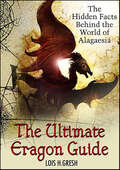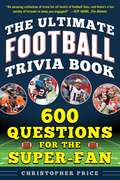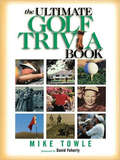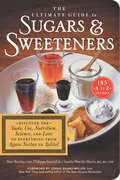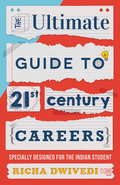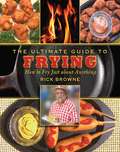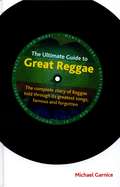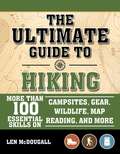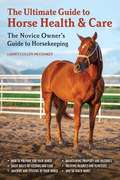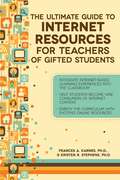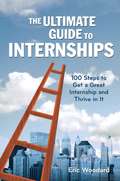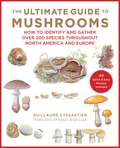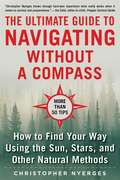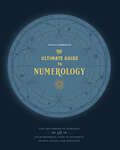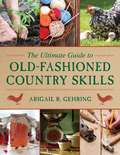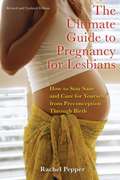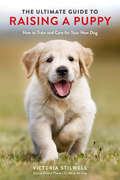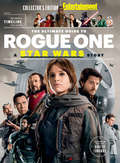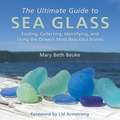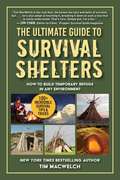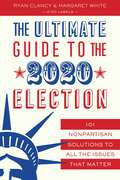- Table View
- List View
The Ultimate Eragon Guide: The Hidden Facts Behind the World of Alagaesia
by Lois H. GreshIn Christopher Paolini's thrilling Inheritance series, when a young boy named Eragon finds a blue gemstone in the middle of the forest, he has no idea what magic is in store for him. It hatches a sapphire-blue dragon, a member of a race thought to be extinct. Eragon bonds with the dragon and soon discovers that he is the first in a new line of Dragon Riders, fated to play a part in a war that is poised to sweep his land.The Ultimate Unauthorized Eragon Guide is an interactive book that looks deep inside the complex world of Alagaësia to reveal facts behind the magical people, places, and creatures that fill the Inheritance series. Also included in this comprehensive guide:* An in-depth look at the many folk references, myths, and legends that form the basis of the books* Fascinating facts about dwarves, giants, shades, and other creatures* A fascinating trip through the lore of dragons* Tips for writing your own fantasy story* A biography of the authorPlus tons of fun boxes and more! This book is a must-have for any fan of the Inheritance books.
The Ultimate Football Trivia Book: 600 Questions for the Super-Fan
by Christopher PriceBecome a football trivia expert with these tough questions! The Ultimate Football Trivia Book tests and expands your knowledge on the sport of football—covering players’ careers from Draft Day to the rookie season, the Pro Bowl, and beyond! In this collection of 600 questions, seasoned football writer Chris Price tests your level of expertise on all things football. Some of the many questions that Price poses include: Who was the last player to collect an MVP and Super Bowl trophy in the same season? (Kurt Warner)Which rookie running back set the NFL record for most rushing yards in a season? (Eric Dickerson)Who is the only quarterback in the top 10 in career playoff passing yards NOT to win a Super Bowl? (Dan Marino)What 2010 Pro Bowl quarterback never started a game in college? (Matt Cassel) Football stars and coaches past and present are represented, from Johnny Unitas to Peyton Manning, Randy Moss to Tom Brady, Bart Starr to Aaron Rodgers, Bill Parcells to Bill Belichick and everyone in between. The Ultimate Football Trivia Book is the definitive test for knowledgeable football fans!
The Ultimate Golf Trivia Book
by Mike TowleThe Ultimate Golf Trivia Book is interactive in that each of the eighteen chapters is assigned a par of three, four, or five. Readers can keep score and earn eagles, birdies, pars, bogeys, and double bogeys dependent on the number of correct answers he or she provides for that chapter. Par for this book's course is 72. Golf-savvy readers will love trying to break 80. Scattered throughout the book are interesting sidebars such as top-ten lists, strange-but-true stories, and more than thirty photographs.
The Ultimate Guide To Sugars & Sweeteners: 185 A to Z Entrees
by Alan Barclay Philippa Sandall Claudia Shwide-Slavin“The very first compendium of the sweet substances we typically eat and what happens once they’re in our body.” —New York Journal of BooksToday, supermarkets and natural food stores feature a bewildering variety of sugars and alternative sweeteners. The deluge of conflicting information doesn’t help. If choosing a sweetener leaves you scratching your head, this handy guide will answer all of your questions—even the ones you didn’t know to ask:Which sweeteners perform well in baking?Will the kids notice if I sub in stevia?What’s the best pick if I’m watching my waistline, blood sugar, or environmental impact?Are any of them really superfoods . . . or toxic?Perfect for foodies, bakers, carb counters, parents, chefs, and clinicians, this delightfully readable book features more than 180 alphabetical entries on natural and artificial sweeteners, including the usual suspects (table sugar, honey), the controversial (aspartame, high-fructose corn syrup), the hyped (coconut sugar, monk fruit sweetener), and the unfamiliar (Chinese rock sugar, isomaltulose). You’ll also find myth-busting Q&As, intriguing trivia, side-by-side comparisons of how sweeteners perform in classic baked goods, and info on food-additive regulations, dental health, the glycemic index, and more. Your sweet tooth is in for a real education!“An honest, comprehensive book based on facts, for those who want to see the meeting of history, science, and common sense. It covers every sweetener you have heard of, plus many you may never encounter. One of the few books that put sugar and sweetness in context so you can make a wise judgment.” —Glenn Cardwell, author of Gold Medal Nutrition
The Ultimate Guide to 21st Century Careers
by Richa DwivediLooking for the career of your choice and don?t want to take the beaten path? Then pick up this book and get ready for your dream career! The Ultimate Guide to 21st Century Careers is designed to provide you with all the information you need about new careers in a range of fields. Specially designed for the modern Indian student, it is the first book in years to give detailed overviews of job profiles under each field it covers, as well as offer a roadmap to students on how to get these jobs. In its pages you will find: ? Detailed information about the roles you can pursue in every field. ? Exercises that will help you assess your skill sets and interests, and correlate them to specific career paths. ? A comprehensive list of colleges, both in India and abroad, that offer courses in each field. ? Estimates of the salaries you could expect to earn in every profession and role. ? Testimonies from experts in different areas, providing a peek into their daily work lives. Whether you are interested in problem-solving or ideating, creating something new or working with people, this book is your one-stop compendium to finding your niche and excelling in it.
The Ultimate Guide to Divination: The Beginner's Guide To Using Cards, Crystals, Runes, Palmistry, And More For Insight And Predicting The Future
by Liz DeanA must-have guide chock-full of time-honored methods for developing your intuition, accessing the unconscious, and parting the veils between the realms. Connect with your intuitive wisdom by exploring the key divination tools and techniques used throughout the ages: crystal casting and pendulums; runes; teacup, coffee cup, and salt readings; palmistry; playing cards and tarot cards; numerology; dice reading; crystal ball gazing; and more.The Ultimate Guide to Divination presents to you the oracles of the ancients in a colorful, modern, and easy-to-use format. Step-by-step illustrations and color photos guide you through the methods, and helpful tables and reference charts show you how to understand and decipher common psychic symbols. Just a few of the valuable divinatory references within:A directory of crystals used in divination, each paired with a color photo of the stone and a guide to its interpretationA glossary of psychic symbols for tea, coffee, and salt readingsAn illustrated guide to the meanings of hand and fingertip shapes, along with interpretations for each mount of the handA complete review of the major and minor arcana cards of the tarot, including layouts for various spreadsNumerology charts and keys for compatibility, auspicious numbers for occasions, and the meanings of your house and phone numbersThere is an oracle for every purpose and question. The Ultimate Guide to Divination is the essential handbook to the mystic arts.Filled with beautiful illustrations and designed to give easy access to the information you’re looking for, each of the references in the Ultimate Guide to . . . series provides simple-to-follow expert guidance as you learn and master your practice.
The Ultimate Guide to Frying: How to Fry Just about Anything (Ultimate Guides)
by Rick BrowneFrom meat to desserts, sides to shellfish, The Ultimate Guide to Frying is the cookbook above all cookbooks for any frying questions. Beginning with a detailed guide to oils and frying equipment, Rick Browne paints the complete picture for anyone interested in how to fry just about anything in their home and make it tasty too! With recipes like Buttermilk Fried Chicken, Walla Walla Onion Rings, Beer-Batter Trout, Sumptown Oysters 'N' Bacon, Fried Shrooms, Kathleen Cauliflowerettes, and much more, this cookbook is sure to leave its readers satisfied.
The Ultimate Guide to Great Reggae: The Complete Story of Reggae Told Through Its Great Songs, Famous and Forgotten (Popular Music History)
by Michael GarniceThe Ultimate Guide To Great Reggae celebrates (and helps you find) the greatest songs of reggae. It focuses on every style of reggae, from mento to Jamaican R&B, ska, rock steady, dub, DJ, roots, dancehall, and more. It opens with an exceptionally comprehensive brief history of reggae. This is followed by 52 chapters, each devoted to in-depth descriptions of the greatest songs for a particular artist or style. Over 750 great songs are detailed, and many more are discussed. More than 200 of reggae's stars, cult artists, one-hit wonders, and forgotten greats are profiled, encompassing the music's full six-decade span. Many of the songs and artists receive their overdue first coverage in print. The seven chapters on Bob Marley describe every one of his more than 600 recordings, his 200 best songs receiving detailed profiles. You can listen to many of the songs described on youtube.com using, for example, Google Assistant.
The Ultimate Guide to Hiking: More Than 100 Essential Skills on Campsites, Gear, Wildlife, Map Reading, and More
by Len McDougallIn The Ultimate Guide to Hiking, readers interested in the outdoors are provided with time-tested advice on hiking and backpacking in the wilderness. Some practical tips include: How to choose the best gearHow to set up a campsiteHow to interact safely with wildlifeHow to properly read a mapHow to forecast the weatherLearning practical navigation skillsAnd so much more!
The Ultimate Guide to Horse Feed, Supplements, and Nutrition
by Lisa PrestonA primary concern of all horse owners and caregivers is that their animals receive the proper feed and in the correct amounts. In seeking information about these matters, it’s easy for owners and caregivers to be lured in-and often misled-by advertisements and endorsements for vitamins, alternative medicines, and other supplementary products.Noted equine nutritionist Lisa Preston offers solid and sensible guidance in these and other areas in her wide-reaching Ultimate Guide to Horse Feed, Supplements, and Nutrition. Among the topics she covers are: Formulating a correct dietary routine for your horse, pony, or mule based on such considerations as breed, age, and size, as well as locale, climate, and the activities in which they take part Understanding the horse’s digestive system and related organs and the effects of various feeds on them Feed-related diseases and other ailments: their causes, prevention, and treatment The use and misuse of vitamins and other supplements Understanding your veterinarian’s diagnoses, tests, and treatments And much moreThoroughly researched using the latest scientific data and featuring dozens of tables, charts, and illustrations, The Ultimate Guide to Horse Feed, Supplements, and Nutrition belongs on the shelf of every horse owner.
The Ultimate Guide to Horse Health & Care: The Novice Owner's Guide to Horsekeeping
by Lainey Cullen-McConkeyFind solutions to the most common problems faced by novice horse owners. Keeping your horse at home can be as wonderful and idyllic as it sounds, but there are also a lot of things which need to be taken into consideration to make sure you and your horse’s new home are ready. This book will guide you through some of the potential pitfalls, providing a simple and easily digestible overview of basic at-home horse health and care. With more than thirty years of experience, horse owner, trainer, and caretaker Lainey Cullen-McConkey offers expert insight on topics such as creating and maintaining a safe living environment for your horse, the basic rules of feeding and care, and invaluable advice on what to do if something goes wrong. Other helpful topics include: What to know before you bring home your horseBasic anatomy and systems of the horseHealthcare and monitoringMaintenance of property and pasturesSuggestions on what to do if your horse is injured or illAnd so much more!The Ultimate Guide to Horse Health & Care covers everything you need to know and do both before and after bringing your horse home.
The Ultimate Guide to Internet Resources for Teachers of Gifted Students
by Kristen Stephens Frances KarnesWith "The Ultimate Guide to Internet Resources for Teachers of Gifted Kids," educators gain a detailed overview of how they can use the Internet to teach new information, extend students' learning, and offer exciting opportunities for differentiation. The authors discuss the many ways in which Internet resources might be used, as well as giving tips on connecting with experts and peers, conducting responsible research, evaluating websites, and more. The book's extensive annotated listing of online resources will make it easy for teachers of gifted kids to plan lessons, enhance students' understanding of material, and encourage students to pursue their academic and extracurricular interests.
The Ultimate Guide to Internships: 100 Steps to Get a Great Internship and Thrive in It (Ultimate Guides)
by Eric WoodardDiscover the seminal book on turning your internship experience into a career-building launchpad for your future. Author Eric Woodard, who got his start as a star intern in the White House, has mentored hundreds of interns as they transition in their careers to something bigger and better. In these pages he lays out the basics of the internship game, the questions to ask when applying, and the best courses of action for turning an internship into a desirable career. Whether you’re still in school, looking for a job after college, or this is your third career change, The Ultimate Guide to Internships will give you excellent professional guidance on getting to the next level, expertly covering such topics as: Identifying internships that will serve your personal career goals Distinguishing yourself as an applicant Knowing what to expect on the job Impressing your employer and superiors Networking effectively in the work environment Preparing yourself for any obstacles Transitioning to a full-time job And many more!Told with humor and honesty, Eric’s advice always focuses on how to make the most of your position, be your best self, exceed others’ expectations, and proudly stand out as the best intern in the office. For anyone who is ready to start their dream career, let The Ultimate Guide to Internships be your handbook as you begin your journey forward, one step at a time.Allworth Press, an imprint of Skyhorse Publishing, publishes a broad range of books on the visual and performing arts, with emphasis on the business of art. Our titles cover subjects such as graphic design, theater, branding, fine art, photography, interior design, writing, acting, film, how to start careers, business and legal forms, business practices, and more. While we don't aspire to publish a New York Times bestseller or a national bestseller, we are deeply committed to quality books that help creative professionals succeed and thrive. We often publish in areas overlooked by other publishers and welcome the author whose expertise can help our audience of readers.
The Ultimate Guide to Mushrooms: How to Identify and Gather Over 200 Species Throughout North America and Europe
by Guillaume EyssartierEverything You Could Ever Want to Know about Mushrooms! Mushrooms are an incredibly vast range of species, including all shapes and sizes and colors. This exciting collection includes a wealth of information on two hundred essential mushroom varieties, including their: Scientific namesHabitatsModes of developmentBotanical specificitiesUses in culinary cuisineAnd more! Spread throughout this book are hand-drawn illustrations and full-color photographs of every mushroom you can imagine. Whether you want to identify mushrooms, study mushrooms, or use edible mushrooms in your recipes, The Ultimate Guide to Mushrooms is for you!
The Ultimate Guide to Navigating without a Compass: How to Find Your Way Using the Sun, Stars, and Other Natural Methods
by Christopher NyergesLearn how to navigate without a compass, even when it seems impossible! Whether we are walking or driving, whether in the woods, on the water, or in the city, it’s vital that we know where we are and are able to find our way around. But with society’s current dependence on modern tools and technology, many persons would have no idea how to navigate without a compass or GPS. In an emergency situation, that lack of knowledge could easily prove fatal. In The Ultimate Guide to Navigating without a Compass, survival expert Christopher Nyerges provides readers with all the skills that they may need to navigate naturally. The book begins by describing the meaning of natural navigation, and then moves on to describe, in detail, the methods of natural navigation, including using the sun, the stars, the moon, and shadows. Additional topics include: How to read a map How to make a sun dial How to make a star dial How to use clouds to predict weather patterns How to track celestial changes How to gauge time through natural observation And much more! With helpful diagrams, illustrations, and sidebars, The Ultimate Guide to Navigating without a Compass is the fundamental reference book for learning how to navigate by natural methods.
The Ultimate Guide to Numerology
by Tania GabrielleA master numerologist takes you on a journey of self-discovery to learn the meanings of the numbers in your life—to manifest money, magic, and miracles.Numbers underpin our day-to-day lives. Our birthday, anniversaries, addresses, and bank accounts—these are all living codes to where we may find fortune, and where cycles of opportunity reside for us in our careers, homes, relationships, and life events. This guide to the inner workings of numbers will:Decipher your life purpose from your birthdayReveal your destiny from your birth certificate nameShare the meaning of numbers 1–99 and all 26 letters in the alphabetShow you how to read the numbers in your astrology birth chartUnveil your current and future personal years, months, and daysDescribe the meaning of repeated numbers and family “DNA codes”Unlock the significance of your address number (with remedies)Explain the secrets of seeing 11:11 and other number sequencesNaturally align with the flow of money, miracles, and magnificent results. The Ultimate Guide to Numerology is the codex to break the codes!The Ultimate Guide to . . . series offers comprehensive beginner’s guides to discovering a range of mind, body, spirit topics, including tarot, divination, crystal grids, witchcraft, chakras, aromatherapy, and more. Filled with beautiful illustrations and designed to give easy access to the information you’re looking for, each of these references provides simple-to-follow expert guidance as you learn and master your practice.
The Ultimate Guide to Old-Fashioned Country Skills (Ultimate Guides)
by Abigail R. GehringWhether you're a suburbanite looking to live more simply or a die-hard homesteader interested in taking your garden to the next level, this guide is packed with step-by-step instructions, useful tips, vintage photographs and illustrations, and time-honored wisdom--creating one of the most comprehensive books on country skills available. This book is compiled of tested and practical experience passed down from generations of farmers and homesteaders.Here readers can learn about:Creating a vegetable gardenCanning and preservingKeeping poultrySoap makingNatural medicineBridge buildingFarm mechanicsCrop rotationCattle and dairyingThe basics of beekeepingForaging for wild foodFertilizing, soils, drainage, and irrigationBuilding a barnAnd much, much more!Success comes to the person who works the most efficiently--not simply the person who works the hardest. Learn invaluable advice and tips for how to create a sustainable lifestyle and live off the land.
The Ultimate Guide to Pregnancy for Lesbians
by Rachel PepperThe Ultimate Guide to Pregnancy for Lesbians covers everything you need to make the thrilling and challenging journey to motherhood: from choosing a donor to tracking fertility to signing the right papers on the dotted lines. Rachel Pepper's lively, easy-to-read guide is the first place to go for up-to-date information and sage advice on everything from sex in the sixth month to negotiating family roles.Why a second edition? When the acclaimed first edition appeared, the author's daughter was only a few months old. This new edition takes into account the parenting know-how Pepper has developed over the intervening six years, as well as the evolving legal status of lesbian parents, and the increasing importance of the Internet for information on fertility, sperm banks, and donors. The resource section is greatly expanded, as are the sections on each trimester of pregnancy, on childbirth, and on life with a newborn. And Pepper provides more insight into preconception planning for both single lesbians and couples. An indispensable resource, The Ultimate Guide to Pregnancy for Lesbians is now bigger and better.
The Ultimate Guide to Pregnancy for Lesbians: How to Stay Sane and Care for Yourself from Pre-conception Through Birth
by Rachel PepperThe Ultimate Guide to Pregnancy for Lesbians covers everything you need to make the thrilling and challenging journey to motherhood: from choosing a donor to tracking fertility to signing the right papers on the dotted lines. Rachel Pepper's lively, easy-to-read guide is the first place to go for up-to-date information and sage advice on everything from sex in the sixth month to negotiating family roles. Why a second edition? When the acclaimed first edition appeared, the author's daughter was only a few months old. This new edition takes into account the parenting know-how Pepper has developed over the intervening six years, as well as the evolving legal status of lesbian parents, and the increasing importance of the Internet for information on fertility, sperm banks, and donors. The resource section is greatly expanded, as are the sections on each trimester of pregnancy, on childbirth, and on life with a newborn. And Pepper provides more insight into preconception planning for both single lesbians and couples. An indispensable resource, The Ultimate Guide to Pregnancy for Lesbians is now bigger and better.
The Ultimate Guide to Raising a Puppy: How to Train and Care for Your New Dog
by Victoria StilwellThe star of Animal Planet’s It’s Me or the Dog reveals everything you need to raise the perfect pet—and get off on the right “paw” with your new best friend! “By far, one of the best resources for new and future puppy parents.”—Marc Abraham, award-winning veterinarian, broadcaster, and founder of PupAid Celebrity trainer Victoria Stilwell is one the most trusted names in the pet world. In this fun and informative guide, her first for puppies, she teaches you how to navigate each stage of a puppy’s growth, from the first weeks through adolescence. You’ll learn: • puppy-proofing your home• toilet training• building leash-walking and play skills• preventing nipping and excessive barking• caring for your puppy’s health• and more!
The Ultimate Guide to Rogue One: A Star Wars Story (Entertainment Weekly Collector's Edition)
by Gareth Edwards The Editors of Entertainment WeeklyThirty-nine years after the first Star Wars movie entranced audiences around the world comes Rogue One, the franchiseÍs first spinoff film. And now, to celebrate the arrival of a new chapter, Entertainment WeeklyÍs editors and writers bring you a collectorÍs edition that takes you deep inside the universe of Rogue One. The 96-page guide is packed with revealing new interviews with the cast; rarely seen photos of production, new characters, and creatures; and a timeline of the entire Star Wars saga. Extras for fans include:Foreword by director Gareth EdwardsMap of the Star Wars galaxyDeep dives on the Death Star, Darth Vader, and Stormtroopers
The Ultimate Guide to Sea Glass: Finding, Collecting, Identifying, and Using the Ocean's Most Beautiful Stones
by Mary Beth Beuke Lisl ArmstrongAs the owner of one of the world's most elaborate sea glass collections, Mary Beth Beuke gets to talk about these prized ocean gems on a daily basis. Unfortunately, with each passing day, sea glass becomes more and more difficult to find, making the hunt more of a challenge to the seeker-especially one with limited experience in sea glass hunting.There are several reasons why the hunt is so important to the sea glass seeker. Some find their Zen moments in the solitude and beauty of the hunt. Some collect to add color to their life. The history, mystery, and discovery of sea glass are also strong forces that draw collectors to shorelines around the world, looking for these pieces of physically and chemically weathered frosted glass.Whatever your reason for wanting to learn about and start your own collection of sea glass, the window for doing so is closing as pieces are becoming more elusive due to a growth in sea glass popularity and a decrease in recent glass bottle production.In The Ultimate Guide to Sea Glass, Beuke provides information that will help first-time seekers start new collections and veteran hunters learn more about their current sets. Beuke shares her experiences in gathering her own collection via photographs of vibrant and rare pieces, as well.
The Ultimate Guide to Survival Shelters: How to Build Temporary Refuge in Any Environment
by Timothy MacWelchYour guide to shelter in most survival situations from a New York Times bestselling author and survival expert.New York Times bestselling author and survival school founder, Tim MacWelch shows us why shelter is our top survival priority in most emergency situations, and how we can provide ourselves with this lifesaving resource. In The Ultimate Guide to Survival Shelters, MacWelch details our risks for exposure (from both the heat and cold) and guides readers through the myriad of options for providing this necessary resource. Learn how to find, enhance, and build shelters in a wide range of environments and survival situations, and learn how to get by with less than you might have imagined. Throughout this detailed handbook you&’ll find: • The shelters you bring with you, including clothing and basic outdoor gear that everyone should carry • The shelter you find in the wild (like rock overhangs, hollow trees and the right evergreen trees) • Tarp Shelters (a simple square of plastic or fabric can become dozens of practical shelter styles) • The shelters you can build from vegetation (sticks and leaves don&’t sound like much, but they can become a shelter that protects from the worst of weather) • Snow shelters, including the ubiquitous igloo, and other snow shelters that are even easier • Advanced shelters (with the right tools, semi-permanent shelters are within reach, all you need is a plan and building materials) • Shelter in modern emergencies (your car, office and familiar haunts can become a shelter in a disaster, here&’s how to make the most of them) • Make any shelter better, with these simple tricks and tips for warmth, waterproofing, cooling, pest control, and comfort!The Ultimate Guide to Survival Shelters will give readers much more than just the knowledge to build a shelter in an emergency, it provides the tools to become a problem-solver and think outside the box in any situation.
The Ultimate Guide to the 2020 Election: 101 Nonpartisan Solutions to All the Issues that Matter
by Margaret White No Labels Ryan ClancyWill Donald Trump&’s Mexican border wall actually make our country safer? How much will Bernie Sanders&’s Medicare for All plan really cost American taxpayers?You&’ll find the answers in this book. The 2020 US presidential election doesn&’t seem so much a battle of ideas as it does a war of two tribes bent on the other&’s destruction. The Far Left and Far Right increasingly dominate and drive America&’s political debate, leaving a majority of Americans feeling left out and left behind. The Ultimate Guide to the 2020 Election gives a voice to this majority and provides an unbiased education on the true nature of the problems America faces on several key issues, including: • Health Care • Energy & Climate Change • Infrastructure • Big Tech & Privacy • The American Dream • Immigration • The National Debt • Gun Safety Beyond these policy issues, No Labels senior advisors Ryan Clancy and Margaret White present ideas for rescuing American democracy itself. Complete with sample questions for the 2020 presidential candidates and an inclusive Unity Agenda that addresses concerns on both sides of the aisle, this nonpartisan political handbook should be required reading for all US voters.
The Ultimate Juices and Smoothies Encyclopedia: Your Essential Guide To Healthy And Delicious Drinks
by Jill HamiltonFrom veggie juicer recipes to fruit smoothies, The Ultimate Juices and Smoothies Encyclopedia has it all! With over 300 pages of recipes, this encyclopedia contains the perfect recipe for whatever mood you are in. Whether you are seeking a juice remedy for a migraine, cleansers for a juice fast, a protein smoothie, or a chocolate truffle smoothie--you can find it in The Ultimate Juices and Smoothies Encyclopedia.
